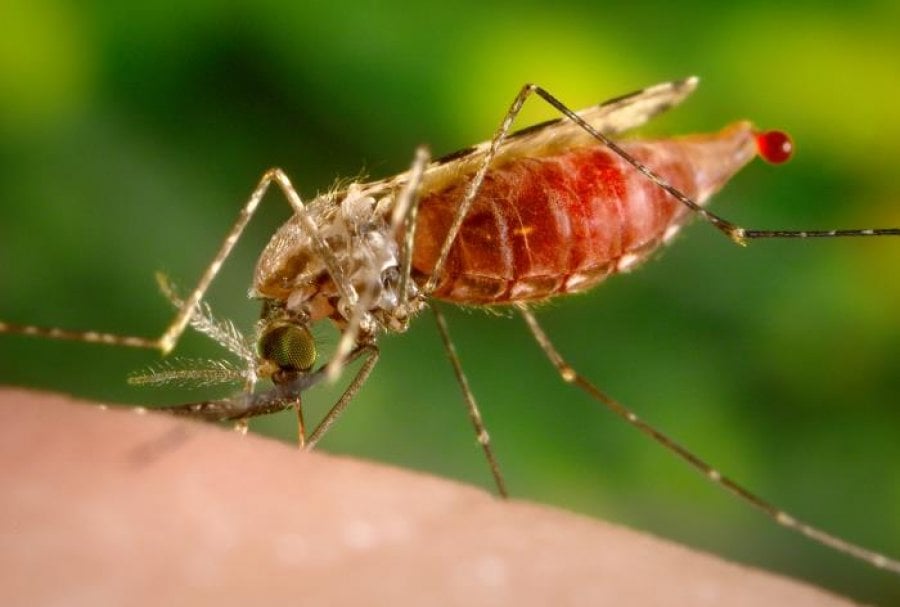Mosquito bite frequency influences malaria spread
23 January 2018 London School of Hygiene & Tropical Medicine London School of Hygiene & Tropical Medicine https://lshtm.ac.uk/themes/custom/lshtm/images/lshtm-logo-black.png
Anopheles mosquito. Credit: CDC Public Health Image Library/James Gathanay
A small number of people who are repeatedly bitten and infected by mosquitoes in each malaria season may account for much of the disease’s spread, according to a new study published in eLife.
The findings suggest that variation in biting frequency within regions and even households is likely to play a key role in the success of malaria control efforts. Understanding this variation will be crucial to ensuring sufficient coverage of interventions that reduce and interrupt transmission of malaria.
Professor Chris Drakeley, senior author from the London School of Hygiene & Tropical Medicine, said: “Much has been learned from experimental studies of mosquito biology, behaviour and control. However, multiple factors surrounding exposure to mosquitoes mean that, while valuable, studying the insects alone will not accurately capture the variation in actual exposure among individuals.
“By linking the blood meals of wild-caught mosquitoes to humans living in the households where they were collected, we have previously shown that mosquitoes feed more often on adults. In this new study we’ve extended this analysis to look at variation in the distribution of mosquito bites among individuals in the same houses at different times during the malaria season.”
Researchers collected hundreds of mosquitoes from 35 households in Balonghin, Burkina Faso, Africa, and compared the genetic material from blood meals of these mosquitoes with that of people living there. From this, researchers were able to work out how many people the mosquitoes had bitten, giving them an idea of the variation of biting frequency across the village and at different times in the malaria season.
Overall, they found that the distribution of mosquito bites was much more variable than traditional epidemiology models assume. Between 76% and 95.5% of the blood meals came from just 20% of people tested, across all households and age groups.
Within households, there were marked differences in mosquito exposure. Some people were bitten much more often than others, as their DNA was matched to a considerably higher number of blood meals from the isolated mosquitoes. And in houses with at least three study participants, the person who received most bites typically accounted for more than 50% of the matched blood meals linked to that household.
Interestingly the study found that although people who were linked to a high number of the blood meals often lived in households that had a large total number of mosquitoes, there were still people living in these houses who had relatively few or no bites.
Researchers also found some consistency in the preferences of mosquitos when deciding who to bite during a single season, because similar links between blood meals and study participants were seen at the start and end of the study. However, some people who were found to be most frequently bitten received few or no bites in previous surveys – suggesting that mosquito preferences change over time. This makes it even more challenging to predict malaria risk and control transmission in these areas, suggesting that ongoing analysis of biting frequency would be useful.
Moussa Guelbeogo, Senior Entomologist at the Centre National de Recherche et de Formation sur le Paludisme in Burkina Faso said: “We observed significant variation in mosquito biting that could be linked to a threefold or higher increase in the transmission efficiency of malaria.
“Our findings show significant differences between and within households in terms of the distribution of malaria-infected mosquito bites, and support the design of interventions that aim to reduce transmission by better targeting of local populations.”
Publication
Wamdaogo Guelbeogo, Bronner Goncalves, Lynn Grignard, John Bradley, Samuel Serme, Joel Hellewell, Kierstin Lanke, Soumanaba Zongo, Nuno Sepúlveda, Issiaka Soulama, Dimitri Wangrawa, Laith Yakob, N'Fale Sagnon, Teun Bousema, Chris Drakeley. Variation in natural exposure to anopheles mosquitoes and its effects on malaria transmission. eLife Journal. DOI: 10.7554/eLife.32625
If you enjoyed this article and would like to build a career in global health, we offer a range of MSc programmes covering health and data, infectious and tropical diseases, population health, and public health and policy.
Available on campus or online, including flexible study that works around your work and home life, be part of a global community at the UK's no.1 public health university.